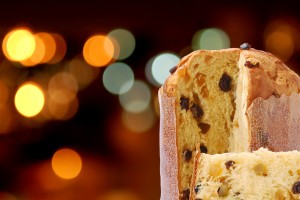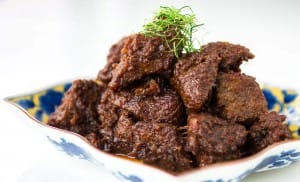To evoke the Christmas feeling, some expats and locals who migrated to Bali talk about their Christmas traditions, and the things they miss the most.
“I miss my family. To me Christmas is the time to be surrounded with your loved ones and cherish the moments together,” says Dinda Miani.
Dinda Miani is a Christian from Central Java who moved to Bali a decade ago. She is married to an Italian and both have shared a life between Bali and Italy over the last few years.
In her husband’s Italian family, Christmas equals a three-day festivity with lots of traditional foods. The festivities start on Christmas Eve in a tradition called Wigilia, when presents are exchanged and sweets like pandoro (spongecake), panettone (spongecake with dried fruit), torrone (chocolate with nuts), and sapori (almond cake) fill the table.
For Christmas lunch, lamb chops (abbacchio), lasagna, roast beef, and potatoes served with salad, salami, prosciutto, mix cheeses, bread—and of course red wine—take over the table. Dessert like struffoli, a Neapolitan dish made from deep fried balls of dough covered with honey and dried cherries follows after, and the festivity is perfectly closed with whole chicken soup (brodo di galina) served for lunch on Boxing Day (26 December).
But unlike in Italy, her Christmas celebration in Bali sees less Italian foods. “I usually cook lamb chops and steak with salad, bake potatoes, beef rendang, fried noodles, asparagus soup, and mix fruit salad.”
Although it was easy for her to enjoy a Bali-style Christmas, her husband still needs something to please his Italian sweet tooth. “My husband does miss a lot of things, especially all the Italian sweets,” she says. “But we manage our craving OK. Usually we ask some friends or family to bring some foods we like when they visit us in Bali. Or we make our own struffoli; we can get the ingredients easily in Bali.”
When most of the rest of the world start their excitement on Christmas Eve, the Dutch steal the start way earlier, says Hebert Klooiman. “We start to give presents on 5 December, not put it under the tree on 25 December like others,” he recalls. “We put the presents in a big basket and pretend that Sinterklaas and his servants, the Black Piet, would have basically dropped the presents off by the back door.”
But the dining tables still remain empty up until Christmas Eve, when it’s suddenly filled with green and red decorations, which is later covered up with foods like pork loin with mustard sauce and boiled potatoes. “The Netherland doesn’t have any fantastic cooking, and has become less and less traditional recently. In Christmas, usually people either make a big poultry—we’re not very turkeyish—but what’s also happening is a lot of beef fondue, with sauces and French breads,” he says. “It’s very family-orientated. Usually one person does all the cooking, but nowadays you’re asked to bring some dishes.”
In Bali, Hebert invites nine to 10 friends to his house in Sanur and celebrates the island-style Christmas in his garden. Each guest brings food and drinks and shares the joy one day after the holy day. Unlike Dinda, Hebert isn’t really tied up with his traditional foods when celebrating Christmas in Bali and enjoys different choices of food, from foie gras to mixed southern European foods served in a 10-course set menu.
“I usually start the cooking preparation days before, and on Christmas day I serve slow-cooked lamb and thyme that is prepared for six hours, lots of wine and also various cheeses. Most important is my homemade Italian cheese, which I make myself four months before Christmas. And smoked eel that’s usually what we eat in The Netherlands. It’s very, very delicious.”
“But the best thing about Bali is that you can find almost everything here, so preparing your favourite Christmas foods isn’t that hard,” he adds. “But the biggest difference is, of course, the family is not here, unless you have a family with kids.”
Interestingly, Dutch-origin food is something that one Bataknese misses for Christmas. Tressabel Hutasoit has been away from her big family for the last five years and always misses her grandmother’s cooking when it comes to Christmas.
“You know it’s Christmas when macaroni schotel, klappertart, vruchtensalade (fruit salad) and roasted pork with andaliman sauce—that’s very North Sumatran—are on the table. It’s a huge Christmas dinner,” says Tressabel. “Perhaps because Christmas in North Sumatra is something we inherited from the colonial missionaries, that’s why we have some Dutch foods in our Christmas supper.”
But for her, Christmas isn’t just about colourful festivities. Family is the core for this celebration, and being together with her big family is the most important thing of all. “We spend times together, thanking Jesus for all the blessings for the past years, singing carols with younger cousins and playing Bible trivia quiz. Those are the things I miss the most. Good fun.”
When away from her family during Christmas, she tries to pay for her absence by sending presents and calling them on Christmas day. “I miss the togetherness of course, but I always try to be back for Christmas if possible,” she says. “But if not, then I will go to church with friends. And since no one toss Christmas dinner or lunch, my friends and I would dine at our favourite restaurant for Christmas brunch usually on 25December. And we do Secret Santa too.”
For Finnish Joni Kalke, it’s the silence that he misses the most (and certainly not snow).
“The President announced national Christmas silence, so it’s time to be quiet and enjoy a few days on the table full of traditional delicacies, sharing presents and time with family. Christmas is a celebration we spend peacefully with family.”
According to Joni, in Finland people go to the cemetery after church to bring flowers to those who have passed away, then go home and spend a peaceful time with relatives while enjoying yule bread and casseroles made from rutabaga, carrot, and potato for the supper.
“But in Bali we never really cook any Finnish traditional Christmas foods, we only have a barbeque and vodka and beer, probably because most of us are a bunch of guys lacking Finnish mamas in the kitchen, and just want to get in the Christmassy mood. What we always do is surf in the day and go quickly to the supermarket and bottle store afterwards.”




